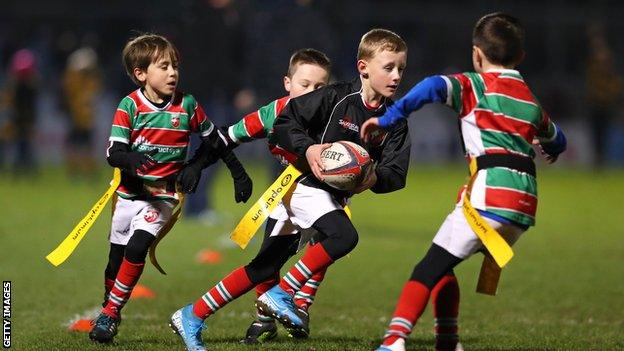Calls for tackling ban in school rugby over concerns of impact
- Published

Tag rugby is a form of the game which avoids the need for tackling
A group of academics want tackling to be banned in school rugby and have written to the UK's chief medical officers calling for them to secure government intervention.
Experts from Newcastle, Winchester and Oxford Brookes universities say they have concerns about the potential impact on young, developing brains of repeated concussive blows.
They say rugby union and league needs to change to protect children, but that children should have a choice to tackle outside of the school environment.
The Rugby Football Union (RFU) says that it "works hard to manage the risk involved in the contact nature of rugby, particularly for young people."
Contact is introduced gradually in youth rugby from the under-nine age group, beginning with tackling.
In the open letter to the four chief medical officers, the academics say: "We are writing to ask you to take the necessary steps to review the evidence on risks of injury and harms from rugby in school children and having done so to advise the UK government to remove the tackle from the sport."
The letter references research by the RFU which they say shows no "discernible physical health benefits" from playing full contact rugby union versus non-contact forms like touch rugby.
Attempts have been made to ban tackling in school rugby in the past, with this same group writing letters twice before, in 2016 and 2017.
But they hope to get more traction this time, given the recent news that prominent ex-players, including the England World Cup winner Steve Thompson, have been diagnosed with early signs of dementia and intend to sue a number of governing bodies.
Dr Adam White, lecturer in sport and coaching science at Oxford Brookes University, said: "We must now do everything we can to protect our children from suffering from the same mistakes."
The RFU said: "PE in school is compulsory however rugby is not. It is up to schools how they organise their PE curriculum and the RFU and England Rugby Football Schools Union work closely to support teachers and coaches with guidance and resources, especially around players' safety and welfare.
"We recognise that contact sport does not appeal to everyone. Rugby for young people at schools or clubs in England exists in different forms, both contact and non-contact such as touch or tag. The rules in operation ensure maximum possible safety for children, allowing players the time to learn rugby basics before contact is gradually introduced."
The letter is also signed by Professor Allyson Pollock, director of the Newcastle University Centre for Excellence in Regulatory Science, and Dr Eric Anderson, professor of sport, health and social sciences at the University of Winchester.

Documentaries Like Nowhere Else: From inspiration to infamous, the story of Lance Armstrong
Comedy Like Nowhere Else: Give Kurupt FM a go with the People Just Do Nothing box set
